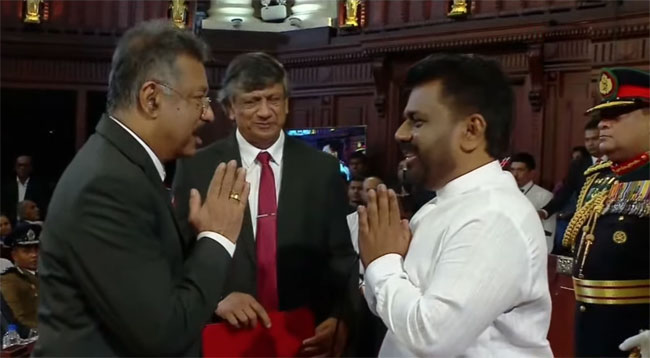Colombo: the promises of newly-elected President Dissanayake
The victory of the 55-year-old leader of a Marxist-leaning party breaks with the country’s “dynastic” politics, reflecting the demands of the Aragalaya movement that ousted the Rajapaksas. During the election campaign, the new president pledged to review the austerity policy imposed by the International Monetary Fund, but also reopen the investigation into the Easter 2019 attacks. Both India and China reacted to the outcome of the vote.
Colombo (AsiaNews) – As public opinion polls anticipated, Anura Kumara Dissanayake was elected as the tenth president of Sri Lanka.
A Marxist-leaning leader of a left-wing coalition called the National People's Power, he won 5.74 million votes (42 per cent) against 4.54 million (32 per cent) for opposition leader Sajith Premadasa.
The outgoing president, Ranil Wickremesinghe, who took over in 2022 at the height of the economic crisis that saw then President Gotabaya Rajapaksa flee the country, received less than 20 per cent of the vote.
The turnout was around 79 per cent, but since no candidate won an outright majority, ballots had to be counted a second time for the first time in the country's history.
Under the current preferential system, Sri Lankan voters get to rank three candidates; if no one passes the 50% plus 1 threshold, their second and possibly third choices are counted.
Dissanayake, 55, has led the pro-Chinese Marxist-Leninist People's Liberation Front (Janatha Vimukti Peramuna, JVP) since 2008. In the 1970s and 1980s, the party launched an armed insurrection against the government to create a socialist, ethnically Sinhala state, especially after the signing of the Indo-Sri Lankan agreement in 1987.
After graduating in physical science, Dissanayake entered politics that same year, and in 2014, he apologised for his party’s past violence, and progressively began to moderate its positions.
"We need to establish a new clean political culture," he said during today’s inauguration ceremony. "I have said before that I am not a magician – I am an ordinary citizen. There are things I know and don’t know. My aim is to gather those with the knowledge and skills to help lift this country."
Dissanayake received a Buddhist blessing at the end of his address, which was delivered only in Sinhala. But the country’s other religions were also present, including representatives of Islam, Hinduism, and Christianity.
Various experts and observers view the new president’s election as a break with the "traditional" leaders (and clans) who have dominated Sri Lankan politics. The scion of the Rajapaksa clan, who was one of the 38 candidates, won less than 3 per cent of the vote.
For Mahendran Thiruvarangan, a professor at Jaffna University, the election results are a "positive" sign. “The NPP is a political formation that represents some of the core demands of the Aragalaya.[*] Their victory is reason for optimism,” he explained.
During the election campaign, Dissanayake said that in case of victory he would dissolve parliament (where the JVP currently holds only three seats) to reflect the will of the population.
He also pledged to launch an investigation into the 2019 Easter bombings, suggesting that if the authorities have avoided doing this so far, it is because they were afraid to reveal "their own responsibilities".
"It’s not just this investigation," he noted. "Politicians who promised to stop corruption have engaged in corruption; those who promised to create a debt-free Sri Lanka have only worsened the debt burden; people who promised to strengthen the law have broken it.”
Still, under Wickremesinghe, inflation dropped from over 70 per cent in 2022 to 0.5 per cent at present, but is expected to grow slightly by the end of the year, while a quarter of the population (of 22 million people) still lives in poverty and high debt.
The outgoing president congratulated Dissanayake on his victory, but did not fail to say that he “successfully completed the responsibility that history put on my shoulders,” noting that, “I was able to rescue my motherland from bankruptcy within [a] short period of two years.”
Dissanayake and other JVP leaders promised to review the criteria imposed by the International Monetary Fund (IMF) which, guaranteed a loan of about US$ 3 billion in exchange for austerity policies. This has led some economic experts to express concern that a change in economic direction might hinder the path to recovery.
Major regional leaders were quick to congratulate Dissanayake. Indian Prime Minister Narendra Modi said on X that Sri Lanka “holds a special place in India's Neighbourhood First Policy", while Chinese President Xi Jinping stressed that he was ready to uphold the traditional friendship between the two countries, by strengthening mutual political trust, cooperation, and development projects as part of China’s Belt and Road Initiative.
In recent years, Sino-Indian geopolitical confrontation has often played out in Sri Lanka through rival investments in the country’s infrastructure.
A few days before he was elected, Dissanayake said that he would cancel a wind energy project by the India-based Adani group, an investment of more than US$$ 440 million to build wind farms in the country that would sell the energy produced at 8.26 cents per kilowatt hour to Sri Lankans.
This project was also criticised for its environmental impact and the "lack of transparency" and is the subject of litigation before the Supreme Court of Sri Lanka.
[*] Lit. Struggle, the grassroot movement that forced then President Gotabaya Rajapaska to resign in 2022.







.png)










